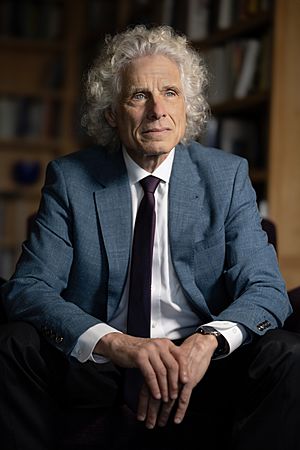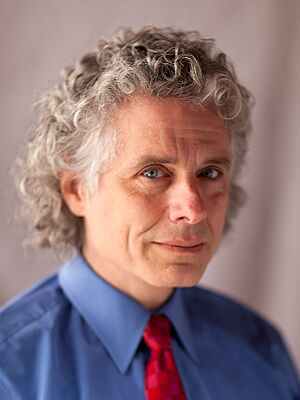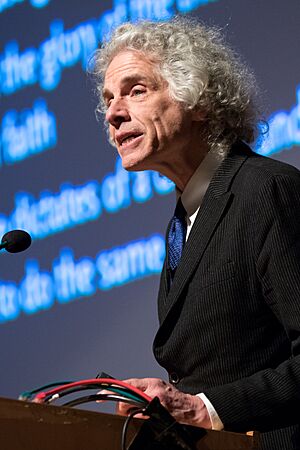Steven Pinker facts for kids
Quick facts for kids
Steven Pinker
|
|
|---|---|

Pinker in 2023
|
|
| Born |
Steven Arthur Pinker
September 18, 1954 Montreal, Quebec, Canada
|
| Nationality |
|
| Education |
|
|
Notable work
|
|
| Spouse(s) |
Nancy Etcoff
(m. 1980; div. 1992)Ilavenil Subbiah
(m. 1995; div. 2006) |
| Relatives | Susan Pinker (sister) |
| Awards |
|
| Scientific career | |
| Fields |
|
| Institutions |
|
| Thesis | The representation and manipulation of three-dimensional space in mental images (1979) |
| Doctoral advisor | Stephen Kosslyn |
Steven Arthur Pinker (born September 18, 1954) is a Canadian-American scientist who studies the human mind and language. He is known as a cognitive psychologist and a psycholinguist. He has written many popular science books to share his ideas with people outside of science.
Pinker is a professor at Harvard University. He supports the ideas of evolutionary psychology, which suggests that the human mind was shaped by natural selection. He also believes in the computational theory of mind, the idea that the brain works like a computer.
He is famous for his books, including The Language Instinct, How the Mind Works, and The Better Angels of Our Nature. Through his work, he has become one of the world's most well-known public thinkers.
Contents
Early Life and Education
Steven Pinker was born in Montreal, Canada, in 1954. He grew up in an English-speaking Jewish family. His father was a lawyer, and his mother was a high school vice-principal. His sister, Susan Pinker, is also a psychologist and writer.
Pinker was always interested in how the mind works. After graduating from Dawson College in 1971, he went to McGill University to study psychology. He then earned his PhD in experimental psychology from Harvard University in 1979.
After finishing his studies, he did research at the Massachusetts Institute of Technology (MIT). He taught at MIT for many years before returning to Harvard in 2003, where he teaches today.
Career and Main Ideas
Pinker's work focuses on two main areas: how we see the world and how we learn language. He has written many books, some for other scientists and some for everyone to read.
How Children Learn Language
Early in his career, Pinker studied how children learn to talk. He argued that the ability to learn language is built into the human brain. This is an idea he explored in his books Language Learnability and Language Development (1984) and Learnability and Cognition (1989).
He studied how children learn grammar rules. For example, to make a verb past tense in English, we usually add "-ed" (like walk becomes walked). But some verbs are irregular (like go becomes went). Pinker noticed that children sometimes make mistakes like saying "goed" or "comed."
He argued this shows that children's brains are trying to use a rule. They have to learn the irregular verbs one by one from memory. This idea suggests that our brains use both rules and memory to handle language.
Is Language an Instinct?
In 1994, Pinker published his most famous book, The Language Instinct. In it, he argued that language is a human instinct, just like how spiders know how to spin webs. He said that humans are born with a special ability for language that evolved over time to help us communicate.
He disagreed with the idea that language is something we just learn from our parents or teachers. He also challenged the idea that the language you speak limits what you can think.
Not all scientists agree with Pinker. Some argue that children learn language simply because humans are good at learning all sorts of things, not because of a special "language instinct." This is part of the "nature versus nurture" debate: are we shaped by our genes (nature) or our environment (nurture)?
How the Mind Works
Pinker wrote more books exploring the human mind.
- How the Mind Works (1997) explained how the mind might have been designed by natural selection to solve problems our ancestors faced.
- The Blank Slate (2002) argued against the idea that humans are born with no built-in mental traits. He claimed that our genes give us a basic "human nature."
- The Stuff of Thought (2007) explored how our words connect to our thoughts and the world around us.
Pinker believes that many parts of our mind work like computer programs, using rules and symbols to process information. This is different from some other theories that suggest the brain works only by making connections, like a giant web.
Views on Human Progress
In his later books, Pinker has written about the history of humanity and the state of the world.
Are We Becoming Less Violent?
In The Better Angels of Our Nature (2011), Pinker argued that violence has been decreasing for centuries. He showed data suggesting that things like war, murder, and cruelty have become less common over time.
He doesn't think this is because human nature has changed. Instead, he believes that things like governments, trade, and the spread of knowledge have encouraged our "better angels"—the parts of our nature that lead to peace and cooperation.
Some historians and scientists have criticized his conclusions. They question his use of data and his interpretation of history. However, the book started a big conversation about whether the world is truly becoming a better place.
The Case for Reason and Science
His 2018 book, Enlightenment Now, continues this theme. Pinker argues that since the Age of Enlightenment (a period in the 17th and 18th centuries), life has improved dramatically for people around the world.
He says that health, wealth, safety, and happiness have all increased because of reason, science, and humanism (the idea that humans can solve their own problems). He defends these values against what he sees as modern-day pessimism and criticism.
Awards and Recognition
Steven Pinker has received many awards for his work.
- He was named one of Time magazine's "100 Most Influential People in the World" in 2004.
- He has won prizes from the American Psychological Association and the National Academy of Sciences.
- He has received honorary degrees from universities around the world.
- His books have been finalists for the Pulitzer Prize.
From 2008 to 2018, he was in charge of the Usage Panel for the American Heritage Dictionary, helping to decide how words should be used correctly.
Images for kids
See also
 In Spanish: Steven Pinker para niños
In Spanish: Steven Pinker para niños
 | Sharif Bey |
 | Hale Woodruff |
 | Richmond Barthé |
 | Purvis Young |




